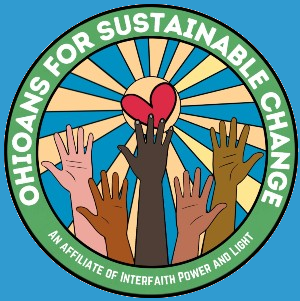Activism is my rent for living on this planet. ~Alice Walker
The whole idea of compassion is based on a keen awareness of the interdependence of all these living beings, which are all part of one another, and all involved in one another. ~Thomas Merton
Faith is taking the first step, even when you don’t see the whole staircase. ~ Martin Luther King, Jr.
Protecting ALL of Creation through Faith-Based Advocacy
 Advocacy rooted in a faith-based context asks:
Advocacy rooted in a faith-based context asks:
What is the just policy?
What is the moral principle?
How do we create a just, loving, and sustainable world together?
What religious teachings inform my actions?
click here for links to faith-based statements on caring for creation.
 To advocate with compassion means…
To advocate with compassion means…
- Listening to others and discerning the hopes and values they express
- Seeing the sacred in all peoples and beings and acting in a way that builds community
- Acknowledging our inter-connectedness
- Seeking justice, not only through political and legal means, but also through the transformation of hearts and minds
- Teaming up with others, whenever possible.
- Advocating for the fair treatment and meaningful involvement of all people regardless of race, color, national origin, or income with respect to the development, implementation, and enforcement of environmental laws, regulations, and policies.
"As people of faith, our mission includes being advocates for vulnerable people and communities that are the most heavily impacted by climate change. From air pollution to droughts to rising seas, it is poor people who are being hit first and worst by global warming. Our goal is to ensure that climate policies provide adaptation and mitigation support for communities domestically and internationally whose health and survival is at stake. We also aim to make sure that all people can participate in and benefit from the growing clean energy economy." (Ohioans for Sustainable Change statement)
 Advocacy is really all about communication, building relationships and sharing your voice about what matters to you.
Advocacy is really all about communication, building relationships and sharing your voice about what matters to you.
Develop a relationship with your elected representatives. The most important communication is personal. Find ways to interact before you have a need. (e.g. attend in-district gatherings; ask for an in-district meeting)
Ways to communicate: You can request a meeting, give them a call, write a letter or email, or provide information. Share your story and why your faith informs your concerns.
Some tips:
• Make sure the legislator or staffer knows that you are a constituent.
• Be personable and keep lines of communication open.
• Keep it simple. Stick to one issue at a time. Expect to have only 30 minutes for a meeting.
• Provide accurate information. Don’t be afraid to admit you don’t know the answer to a question. Promise to research the answer and get back to them.
• Keep your legislators informed and up to date about your activities and concerns. Provide them with information and referrals so they can find out more.
• Get to know your legislator. What are their special interests and causes?
• Get to know legislative staff. A staff member can be a powerful ally.
• Try to get a commitment. Be direct on what action you feel is appropriate for the legislator to take.
• Always follow up with a thank you note or email that reminds the legislator of your visit and restates your asks.
 Contributing to the news is a crucial way to draw attention to public policy. Legislators keep a close eye on media coverage, including Letters to the Editor (LTEs), in their local papers.
Contributing to the news is a crucial way to draw attention to public policy. Legislators keep a close eye on media coverage, including Letters to the Editor (LTEs), in their local papers.
Even if your letter is not published, it can educate and persuade the editors.
- Respond to an article in the paper, if possible. Many papers require that LTEs reference an article that ran in the paper. Some papers do occasionally print LTEs that note a lack of coverage of an issue. However, letters in response to an article in the paper have the best chance of getting published.
- Don’t hesitate to provide a ‘faith voice’, highlighting why you are responding.
- Follow the paper’s guidelines to increase the likelihood that your letter will be printed. If you can’t find the information you need, simply call the paper and ask how to go about submitting a letter in response to a recently published article. Newspapers will typically specify the maximum length of a Letter to the Editor. click here for NEWSPAPERS AROUND OHIO with links to how to submit LTEs for each newspaper.
- Be timely. Respond to an article in two or three days. If you can, send it to the newspaper the same day they publish the article.
- Keep your letter short, focused, and interesting. In general, letters should be under 175 words.
- Include your contact information. Be sure to include your name, address, and daytime phone number; the paper will likely contact you before printing your letter to verify that you sent it.
- Clip out your printed letter and send it to your legislator with a brief cover note. This way you can be certain that he or she sees it and helps you build a relationship with them.It’s always good to have other eyes review your letter before submitting, to help edit for clarity and messaging suggestions.
What is an Op-Ed? Op-eds are opinion pieces that are written by those who aren't on the staff of a newspaper, magazine or website. They offer outside voices the opportunity to express opinions and share ideas in their own words.
Traditionally, they appear opposite the editorial page (hence the name, op-ed), which is where the newspaper's editorial board expresses its opinion on important issues. It can be a challenge to get news organizations to run your Op-Ed piece and it takes time to write an effective op-ed. HERE is a good online resource that might be helpful: 5 Steps to Op-Eds "That Change Minds."
- Sign a Petition in support of Clean Energy. Sign the “Paris: We’re Still In” Pledge.
- Attend public hearings, town halls, and other local meetings. click here for a Town Hall tool kit.
- Walk the Talk! Volunteer with a Green Team at your House of Worship. Schedule an energy audit for your Houses of Worship.
- Encourage your congregation to be a role model in your community. Share your congregational story with Ohio OFSC and your congregational story could influence your representatives.
- Host an In-District Legislator Visit at your House of Worship. A visit can show your representative how your congregation is involved in the stewardship of the environment, energy efficiency, renewable energy, or other sustainable ministries. click here for Suggestions on how to host a Legislator Visit at your House of Worship.
Citizen's Climate Lobby provides online training resources through Citizen's Climate Education. Tutorial videos includes topics such as: Lobbying 101; Climate Justice; Getting your LTE Published; Climate Change and our Psyche; Conservative Messaging...click here to view these videos and build your advocacy skills! Citizen's Climate Lobby's Faith-
 Share your faith voice at the Ohio Statehouse...
Share your faith voice at the Ohio Statehouse...
The Ohio Statehouse basics:
The Ohio General Assembly is the state legislature of the U.S. state of Ohio. The Ohio Senate has 33 Senators. The Ohio House has 99 members.
When a bill is introduced, it is assigned to a committee. The usual process is to have three committee hearings, then a full floor vote.
To Submit Testimony:
- Submit your testimony in written form 24 hours ahead of time. click here for a Testimony Template (provided by How Things Work at the Ohio Statehouse)
- Submit a witness slip with your testimony (you can get that from the committee chair’s office)
- Your testimony should include some statistics and be to the point.
- Other Resources:Ohiohouse.gov and Ohiosenate.gov (where you can find your representative and senator, including contact information; view House and Senate Committee pages and schedule)
- Legislature.ohio.gov (this is the main place to look up legislation, check status, find schedule of when the House and Senate are in session)
- Invite friends to view a relevant documentary. Open the documentary screening to community members and make new friends! For a list of documentary film possibilities, click here. Ohioans for Sustainable Change often has opportunities for faith groups to screen new documentaries or purchase screening kits at reduced prices.
- Attend regional meetings sponsored by Ohio OFSC and offer your suggestions.
- Forward Ohio OFSC emails and invite others to be involved in the Ohioans for Sustainable Change movement.
- Help to raise money to support the mission of Ohio OFSC . Ask your congregation to support Ohio OFSC with a donation. Volunteer to host a “house party” fundraiser. Contact Sara Ward, [email protected] for more details on how you can help support the work of Ohioans for Sustainable Change. click here to donate!
- Follow us on Facebook and then like our posts.
Faith-Based Advocacy Events and Alerts
WE ARE STILL IN! Sign a We’re Still In petition, click here.



